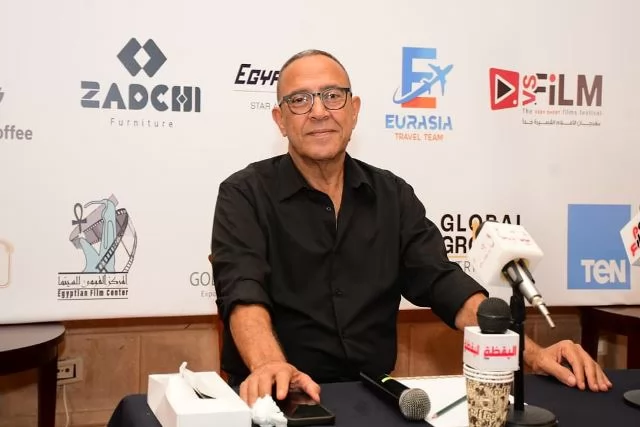- “Masrah Masr relied on improvisational comedy… and its greatest achievement was bringing audiences back to theater halls.”
The VS-Film Festival for Very Short Films honored the artistic journey of actor Ashraf Abdel Baky during a special symposium held on Monday as part of its second edition, currently taking place in Ain Sokhna, Suez.
Critic Mohamed Al-Roubi opened the conversation by highlighting Abdel Baky’s distinctive talent, which caught the attention of the late director Raafat El-Mihi after seeing him in a small role in the play “Khashab Al-Ward” in 1986. El-Mihi then cast him in an important role in his film “Sayyidati Anisati” alongside renowned star Mahmoud Abdel Aziz, marking the beginning of a long and dedicated artistic journey. Despite early fame, Abdel Baky focused heavily on supporting young talents, which is why Al-Roubi described him as an artist with a clear vision and a purposeful project.
Al-Roubi also highlighted Abdel Baky’s major theatrical initiatives, including founding Masrah Masr, reviving the Al-Rehaney Theater, and producing the play “Crime in Maadi,” an Arabic adaptation of a British stage production, which he performed with two different casts — a format not typical in Egyptian theater.
At the start of his speech, Ashraf Abdel Baky recalled that his relationship with film criticism began even before his professional career, as he used to read critic Sami Al-Sallamouni and compare his own impressions of films with those of the critic — something that helped shape his artistic awareness.
He added that he began acting purely as a hobby, performing more than 40 theatrical shows at Youth Centers, Cultural Palaces, and university theaters, before joining the open study program at the Higher Institute of Dramatic Arts in his first official acting class.
With his trademark humor, Abdel Baky reminisced about how he and his fellow young actors used to fund their own sets and costumes — renting costumes from Kamal Marai, who was the only costume rental provider for stage actors at the time. He emphasized that he still keeps an archive documenting every play he participated in, complete with titles and photographs.
He then spoke about his experience with Teatro Masr, launched in 2011 and later renamed Masrah Masr, which relied heavily on improvised comedy and featured one-hour plays designed for television broadcast. The project’s greatest success, he noted, was bringing audiences back to theater seats.
Abdel Baky also revealed other projects that did not receive the same level of fame, including a children’s play starring Samah Hussein and singer Waad Al-Bahri, directed by Nader Salah El-Din.
He further discussed the idea of staging the same play simultaneously with multiple casts in different cities, a concept he encountered during a trip to Europe, where the play “Mamma Mia” was being performed in several theaters at once. Inspired by this, he staged “Crime in Maadi” in Minya, Port Said, Assiut, and Cairo.
Regarding his early film career, he mentioned how difficult the transition was, especially while filming “Hell Under Water” in the 1980s, at a time when Egyptian cinema did not yet use monitors. Coming from theater, he was unfamiliar with film production techniques, but eventually mastered them over the course of 85 films.
Addressing the humorous online criticism videos about his work, Abdel Baky said modern media tools are constantly evolving and should be embraced. He added that what he offers is “light, good-hearted comedy that doesn’t offend anyone.”
The discussion also touched on the creative promotional campaign for his recent film “Al-Sada Al-Afadil”, which went viral on social media. Abdel Baky said the idea came from a group of young creatives and relied on deliberately presenting the opposite of what was true to spark curiosity. He emphasized, however, that the film’s success was also due to its strong cast and the direction of Karim El-Shenawi.
Director Ashraf Fayeq commented during the session:
“I am proud to be from the same artistic generation as Ashraf Abdel Baky. He carved his path through dedication and was the only one among us who had a clear creative vision. He produced ‘Rasha Garee’a’ with a completely different cinematic approach. He never gave up and never compromised his artistic identity.”
Saudi actress Hanan described Abdel Baky as “an inspiring artist” and expressed hope that he would revive Masrah Masr, which had strong impact in her country.
Actor Sabry Fouad also congratulated Abdel Baky, praising his sincerity, commitment to theater, and dedication to nurturing young talent, and expressed his happiness working with him on the film “Seyyad Al-Yamam.”
